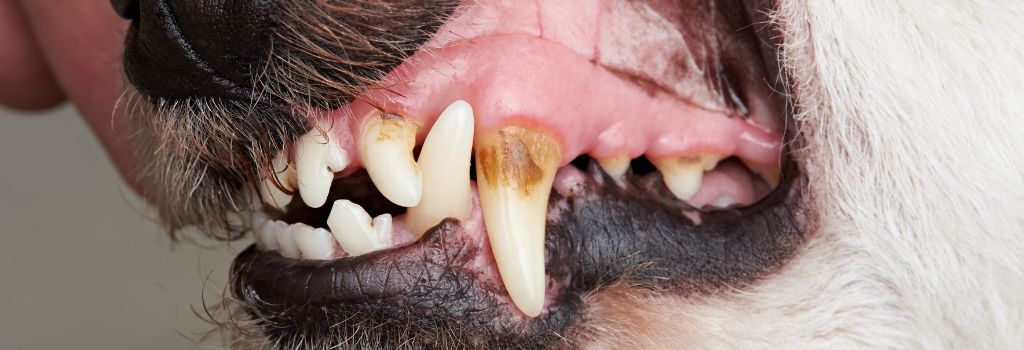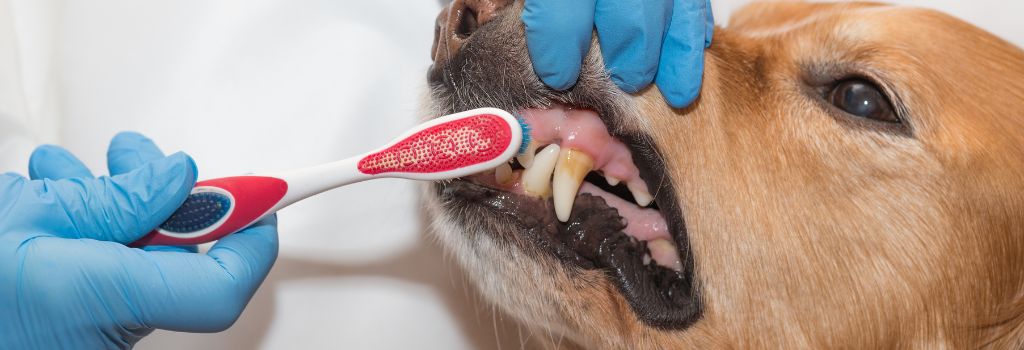Often overlooked but immensely important, dental health is a key piece of the puzzle in your dog’s overall well-being. In this blog, we're not just brushing up on the basics of canine oral hygiene; we're digging deeper to uncover why keeping your canine’s canines clean is crucial for more than just a winning smile. From the link between dental health and systemic diseases to tips on keeping your pooch's pearly whites sparkling, we've got a bowl full of information to share. So, grab your toothbrush and your four-legged best friend, and let's dive into the essentials of ensuring your pup's dental health is nothing less than paw-fect!
The Importance of Dog Dental Care at Home
Did you know dogs are susceptible to dental problems like cavities, fractures, cracks, and enamel erosion? Just like humans, dogs benefit significantly from regular dental care and, ideally, brushing your dog’s teeth should be a daily routine. Consistent brushing not only keeps dental diseases at bay but also contributes to overall health. To ease this process, select a dog toothpaste in a flavor that your pet loves and opt for a comfortable toothbrush, like a finger brush designed for dogs. Remember, human toothpaste is a no-go for your furry friends – canine toothpaste is specially formulated to be safe and effective for them.
While dental treats like Denta sticks and Greenies can be beneficial for maintaining oral health, they cannot replace the effectiveness of regular brushing. They should complement, not substitute, your brushing routine. Similarly, while dental care toys can help reduce plaque buildup, they are not a standalone solution for oral hygiene.

Our tips and tricks for making your brushing battle better:
- Choose the Right Time: Pick a time when your dog is calm and relaxed, such as after a walk or a meal.
- Gather Your Supplies: A toothbrush designed for dogs (finger brushes can be a good option for beginners, both the human and the canine participants), and dog-specific toothpaste (never use human toothpaste as it can be toxic to dogs). Optional: Dog dental wipes for a quick clean-up.
- Introduce the Toothpaste: Let your dog taste the toothpaste first to get used to the flavor. Praise them for licking it off your finger to create a positive association.
- Familiarize Your Dog with the Brushing Motion: Gently rub your finger or a soft cloth over your dog's teeth and gums. Gradually introduce the toothbrush, allowing your dog to sniff and lick it.
- Start Brushing: Apply a small amount of toothpaste on the brush. Gently lift your dog's lips and start with the front teeth, gradually moving to the back. Use circular motions, focusing on the gum line where plaque accumulates. Brushing the outside is most important, but you can brush both the outside and inside surfaces of the teeth, if your dog allows. Gradually try to get all the way to those back teeth where we see the most dental disease.
- Be Gentle and Patient: Keep the first few sessions short and sweet, gradually increasing the time and coverage as your dog gets comfortable. Speak in a calm and reassuring voice throughout the process. Don’t force it if your dog resists; try again later. Even if they only lick the toothpaste off of the toothbrush the first few attempts, this is a win.
- Finish with a Reward: Always end the session positively with a treat or their favorite game. This reinforces good behavior and makes future brushing sessions easier.
- Make it a Routine: Aim for daily brushing, but even a few times a week can significantly benefit your dog’s dental health.
Checking In with the Dogtor
Your veterinarian will check your pet’s mouth at every visit. The vet checks for tartar buildup, gingivitis, tooth fractures, mouth masses, and unusual odors. These are indicators of your dog's oral health. Monitoring the number of teeth, especially in puppies, for proper baby tooth loss and adult tooth growth, is important.
Identifying dental issues in dogs is crucial for their overall health and comfort. Signs of a healthy dog mouth include clean white teeth, calm pink gums, and mild breath.
Here's a list of signs that may indicate your dog is experiencing dental problems:
- Bad Breath: Persistent bad breath can be a sign of gum disease or tooth decay.
- Difficulty Eating: If your dog is reluctant to eat, chews on one side of the mouth, or drops food, it may indicate dental pain.
- Pawing at the Mouth: Dogs may paw at their mouth or rub their face against surfaces if they experience dental discomfort.
- Red, Swollen, or Bleeding Gums: These are classic signs of gingivitis or periodontal disease.
- Yellow or Brown Tartar Buildup: Visible tartar accumulation on the teeth near the gum line indicates poor dental health.
- Loose or Missing Teeth: Teeth that are loose, missing, or falling out can indicate advanced dental disease.
- Excessive Drooling: Increased salivation, especially if it's blood-tinged, can be a sign of oral pain or problems.
- Swelling Around the Mouth: Swelling in the areas surrounding the mouth or under the eyes can indicate dental or gum issues.
- Changes in Eating Habits: If your dog suddenly loses interest in hard food or treats, or is eating slower than usual, it could be due to tooth pain. Vocalizing discomfort during eating is a clear sign of oral pain.
- Change in Chew Toy Habits: A sudden disinterest in chew toys can indicate mouth pain.
- Bumps or Lumps in the Mouth: Any unusual growths in the mouth should be checked by a veterinarian.
- Excessive Licking: Licking lips or air frequently can be a sign of oral discomfort.
- Nasal Discharge and Sneezing: Advanced dental issues can sometimes lead to nasal discharge or sneezing.
- No Obvious Symptoms at all: It is important to remember that the majority of pets with dental disease do not show any outward symptoms that you will notice at home until the disease is severe. This is why having those annual checkups for your furry friends is so important.
If you notice any of these signs, it's important to consult your veterinarian. Early detection and treatment of dental issues can prevent more serious health problems and keep your dog happy and healthy.
 Professional Cleanings, Dental X-rays, and Addressing Serious Dental Issues
Professional Cleanings, Dental X-rays, and Addressing Serious Dental Issues
Regular professional cleanings typically involve an initial exam followed by a separate appointment for the procedure, ensuring a thorough assessment and safe anesthesia administration. Dental X-rays play a critical role during dental procedures, allowing vets to assess the teeth, crowns, roots, and underlying issues beneath the gums.
Sometimes, tooth extractions may be necessary to treat painful dental issues and prevent further harm. Anesthesia is critical for a safe and thorough dental cleaning, ensuring detailed examinations and the pet's safety during the procedure. Veterinarians conduct thorough pre-surgical evaluations, including lab work and physical examinations, to minimize any risks associated with anesthesia. Importantly, age is not a barrier to dental cleaning, and older dogs often require more frequent dental care.
*While anesthesia-free dental procedures are available, they are generally not recommended due to their limitations in providing a comprehensive dental examination and the stress they can cause to pets.
Following any dental procedure, especially extractions or surgeries, antibiotics, and pain medications are prescribed to ensure comfort and prevent complications. Check out this blog, "Post-Op Dental Care and Home Dental Care for Dogs."
The Bottom Line: Dental Health is Overall Health
Understanding and maintaining your dog’s dental health is key to their overall well-being. Regular brushing, staying attentive to dental issues, and consulting with your veterinarian for professional dental care can ensure your dog maintains a healthy, happy smile. Dental care is more than just a cosmetic concern; it's an integral part of your dog's routine health care. So, let’s keep those tails wagging and those teeth sparkling in health and happiness!
If you have questions and you'd like to reach out to us, you can call us directly at (941) 253-5218, or you can email us at staff@uacvet.com. Don't forget to follow us on social media Facebook, Instagram.
